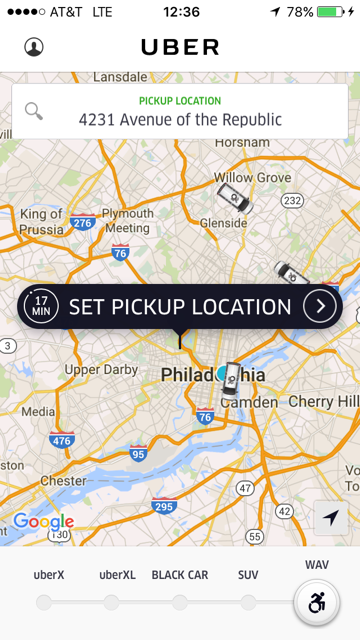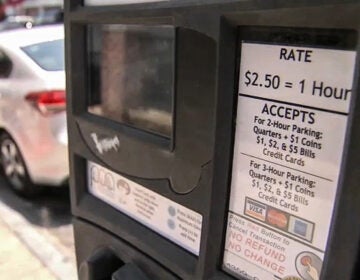Unlikely alliance unites against Uber and Lyft: Disability advocates, cabbies, limos, and PPA

On Tuesday, an unusual coalition of disability advocates, cabbies, limo drivers, and taxi owners came together to beg the Philadelphia Parking Authority (PPA) to stop UberX and Lyft.
Around 30 representatives from the various interests packed the PPA boardroom to present a letter lambasting the authority for lax enforcement against the ride-hailing companies, which operate illegally in Philadelphia.
“It is unacceptable for the PPA to selectively enforce its regulations, inspections, permits, and very significant fees against only hardworking drivers and taxi medallion owners while unfairly allowing billion dollar corporations like Uber and Lyft to operate illegally with no regulatory oversight and no payment of fees and permits in Philadelphia counsel,” read the letter signed by Thomas Earle, CEO of the disability advocacy group Liberty Resources.
The letter also implored the PPA to join lawsuits launched by cab companies seeking a court order to ban UberX from Philly.
Seeing wheelmen and wheelchairs united was a curious sight, given that less than a year ago, the taxi industry was fighting accessibility advocates over a PPA proposal requiring all new taxis to be wheelchair accessible vehicles (WAVs). Philadelphia would be the first city in the U.S. with such an accessibility requirement.
Just a few months before that, Earle was praising Uber for launching UberWAV. UberWAV uses a smartphone app to link disabled riders with professional paratransit providers, similar to how UberBlack connects passengers to professional limousine services.
A few weeks ago, a Daily News report revealed that the PPA worked with taxi companies to lobby against Uber in Harrisburg, a story that and led to excoriating editorials calling the PPA a captured regulator. Uber piled on, holding a press conference to call the PPA “unelected, unaccountable, [and] untrustworthy.”
But now, the disabled have turned on Uber—who they once praised—by supporting the taxi industry—who they’ve fought with for years—by attacking the PPA—who promised them hundreds of new WAVs—which infuriated the taxi owners—who the PPA are colluding with against Uber.
“The enemy of my enemy is my friend,” goes the ancient saying. In today’s disrupted world of taxis, it seems like everyone is enemies with everyone else.
WHEELCHAIR ACCESSIBILITY: SO CLOSE, YET SO FAR
For years, the disabled community lobbied the PPA to increase the number of WAV medallion taxis. The taxi industry resisted, arguing that wheelchair accessible vehicles, which can cost over $40,000, were too expensive and that the additional training and certification needed to drive WAV taxis was too onerous.
In August 2014, the PPA approved a new sealed bid auction for 46 WAV medallions—the first time in fifteen years that any new taxi medallions were auctioned, which are essentially permits to operate a taxicab.
The following March, the PPA proposed new regulations to require every new medallion cab to be wheelchair accessible. After years of fighting the taxi industry and lobbying the PPA, the disabled community seemed to be getting everything it wanted.
But before the first sealed bid on the new WAV medallions could be opened, UberX launched in Philadelphia, immediately eviscerating a taxi permit’s investment value. Eventually, the medallions sold for $50,000 each, down from an initial price of $475,000.
There are now around 30 WAV taxicabs operating in Philadelphia, up from seven before the auction. Many of the newly issued WAV medallions sit in storage, unused. Their owners say business has declined faster and harder than they expected when they bought them, making investments in new vehicles and training drivers infeasible.
“Unlawful taxis are hindering the wheelchair accessible vehicle program,” said Frank Justis, who owns and operates a cab in Philadelphia. “There are ripples from this illegal activity. And one of the ripples hits the disabled community.”
That’s the same point disability advocate Earle made, almost verbatim. “The trickle down of [Uber and Lyft ignoring regulations] to us in the disabled community is that it’s impeding, or slowing down, the Parking Authority’s move to improve wheelchair accessible taxis in Philadelphia.”
Cab owners still oppose regulation to require all new taxis be wheelchair accessible. “Not a single one” has submitted testimony before the rule-making authorities in support of the change, said PPA General Counsel Dennis Weldon, who admits that the industry probably couldn’t afford to comply with the new rules so long as Transportation Network Companies (TNCs) like UberX and Lyft operate illegally with impunity.
Instead, the taxi industry has slowly come around to an unwelcome truth: The PPA, long its bane, is now its only hope. After protests at City Hall failed to convince City Council or Mayor Jim Kenney to intervene, only the PPA remained.
“If we don’t stop [TNCs] now, we’ll be done before the lawsuit is finished,” said Ali Razak, a limo and UberBlack driver who served as a spokesman for the limo and cab drivers at Tuesday’s meeting. Razak said it’s up to the PPA to put the TNCs, which generally ignore the expensive regulations the taxis and limousine companies comply with, on a level playing field.
“We just demand justice, a level playing field,” said Alex Friedman, who owns Freedom Taxi. “We demand that people with disabilities are not discriminated against.”
The disabled community, finally promised their accessible taxis, agrees.
“Considering the size of the Authority, you’d think they could gain a bit of the upper-hand [against UberX and Lyft],” said Earle. “And they should. That’s their job. Their obligation to the riding public is to ensure that the ride-sharing companies comply with the law, including the Americans with Disabilities Act, and that’s not happening.”
The Americans with Disabilities Act (ADA) is one of the reasons why Earle and other disability advocates have soured on Uber, despite the introduction of UberWAV.
In ongoing court battles across the U.S., Uber has claimed that it is a technology company, not a transportation provider subject to the ADA. The ADA requires transportation services to accommodate wheelchair users if the chair can fit, meaning even UberX drivers in their own cars should make room if they have enough space.

“Their position that they are not covered by the ADA is like McDonalds saying ‘Hey we’re not covered by Title VII of the Civil Rights Act, and we can ask black people to sit outside and eat their hamburgers,’” said Earle. “It’s different treatment for different people, and it should be the same for everybody.”
While UberWAVE has added to the number of accessible rides available, it’s been a drop in the bucket so far. At 12:37 p.m. Tuesday, there were three UberWAV rides available around Philadelphia.
Even if the new vehicles add to Uber’s overall accessibility, they are far more expensive than other Uber options, said Earle. The ADA prohibits price discrimination based on accessibility. Taxis, subject to the PPA’s strict price controls, have to charge the same to a person in a wheelchair as anyone else. Earle said UberWAV costs more than UberBlack, something Uber disputes. Using the Uber’s fare estimater, UberWAV trips were priced lower than UberBack trips.*
An Uber spokesman said in an email that the company was “actively exploring new ways to make uberWAV more affordable.”
If the taxi industry cannot afford new vehicles, the number of accessible rides available for Philadelphia’s 128,000 residents with ambulatory disabilities will remain fixed. That would place added burdens on SEPTA’s already less-than-ideal paratransit services. That’s a future Earle doesn’t want to face.
“We’ve invested too much in the advocacy over the years to see it all go into the toilet because a new technology comes in and turns the system upside down,” said Earle.
Philadelphia’s taxi industry is the devil the disabled community knows. Even as Uber promotes its UberWAV service, there are no legislative proposals to require TNCs to provide some minimum of accessible service, meaning once the wheelchair accessible taxis are gone, there’s no promise Uber will fill the void. Not that those laws would give Earle much comfort. The ADA and taxi regulations aren’t the only laws Uber says they don’t need to comply with: They’ve fought to avoid employment laws, too.
PITY the PPA?
The PPA is stuck in an untenable position, says Weldon. They’re trying to make everyone happy, he says, trying to find some heroic bargain. Instead, the PPA has wound up playing the villain in every episode of this saga, no matter what they do.
The PPA’s lawsuit against UberX and Lyft was filed in the Authority’s administrative law court back in August, and remains ongoing. Assuming the PPA wins—which is likely—Uber would be able to appeal to the Court of Common Pleas. An adverse ruling there would allow for additional appeals to the Commonwealth Court and the Supreme Court of Pennsylvania. The litigation could take years.
“We want them to go into real court – the commonwealth court or federal court – and join the other impacted parties here and seek an injunction,” said Earle, who has a law degree from Rutgers. “In the administrative process, you’re getting what’s going on now: widespread, continued defiant operations in Philadelphia.”
The lawsuits launched by taxi companies and limo drivers were filed in federal court and the Common Pleas Court.
Critics say the PPA just wants to maintain a cushy revenue stream from the licenses, permits, fees, and fines it issues to medallion taxis. To those jaundiced eyes, the authority would be fine to see the taxi industry razed by the venture capital-backed Visigoths, so long as the authority can to seek rents from the marauders. Just so long as the money comes in, supporting the Republican Party’s last bastion of patronage employment in Philadelphia.
Only 42 of the PPA’s 1,023 employees work in the Taxi & Limousine Division. Most—611—work in on-street parking enforcement. The PPA, which has been criticized in the past for high overhead, also has 151 administrative employees, making up 14 percent of its workforce.
Across the Commonwealth, Uber has been welcomed with open arms, and the accompanying economic pains of a few cab owners has been met with the same insouciance that milkmen saw when another disruptive technology—refrigeration—put them out of work. The Public Utility Commission, which regulates taxis and limos everywhere in Pennsylvania but Philadelphia, seems to have no problem with TNCs, granting them temporary approval to operate across most of the state.
Already, a number of bills have been introduced in Harrisburg to legalize TNCs. The PPA has supported some of these bills, but only those that would allow it to retain oversight over TNCs in Philadelphia.
*CORRECTION: This paragraph originally stated that UberWAV trips cost more than UberBlack trips. A spokesman for Uber said this is false. On Friday, PlanPhilly used the app’s trip estimate feature to compare prices between UberWAV and UberBlack. The UberWAV estimate was $20-$25, the UberBack estimate was $18-$23.
WHYY is your source for fact-based, in-depth journalism and information. As a nonprofit organization, we rely on financial support from readers like you. Please give today.




